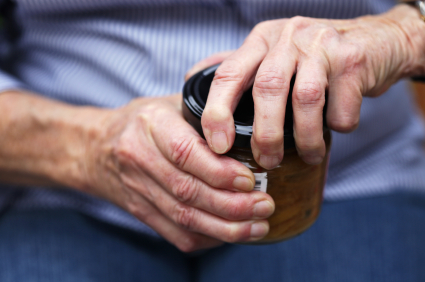Grip strength may provide clues to heart health
A strong or weak hand grip carries more than just social cues. It may also help measure an individual’s risk for having a heart attack or stroke, or dying from cardiovascular disease. As part of the international Prospective Urban and Rural Epidemiological (PURE) study, researchers measured grip strength in nearly 140,000 adults in 17 countries and followed their health for an average of four years. A device called a dynamometer was used to assess grip strength. Each 11-pound decrease in grip strength over the course of the study was linked to a 16{c754d8f4a6af077a182a96e5a5e47e38ce50ff83c235579d09299c097124e52d} higher risk of dying from any cause, a 17{c754d8f4a6af077a182a96e5a5e47e38ce50ff83c235579d09299c097124e52d} higher risk of dying from heart disease, a 9{c754d8f4a6af077a182a96e5a5e47e38ce50ff83c235579d09299c097124e52d} higher risk of stroke, and a 7{c754d8f4a6af077a182a96e5a5e47e38ce50ff83c235579d09299c097124e52d} higher risk of heart attack. The connections between grip strength

A strong or weak hand grip carries more than just social cues. It may also help measure an individual’s risk for having a heart attack or stroke, or dying from cardiovascular disease.
As part of the international Prospective Urban and Rural Epidemiological (PURE) study, researchers measured grip strength in nearly 140,000 adults in 17 countries and followed their health for an average of four years. A device called a dynamometer was used to assess grip strength.
Each 11-pound decrease in grip strength over the course of the study was linked to a 16{c754d8f4a6af077a182a96e5a5e47e38ce50ff83c235579d09299c097124e52d} higher risk of dying from any cause, a 17{c754d8f4a6af077a182a96e5a5e47e38ce50ff83c235579d09299c097124e52d} higher risk of dying from heart disease, a 9{c754d8f4a6af077a182a96e5a5e47e38ce50ff83c235579d09299c097124e52d} higher risk of stroke, and a 7{c754d8f4a6af077a182a96e5a5e47e38ce50ff83c235579d09299c097124e52d} higher risk of heart attack.
The connections between grip strength and death or cardiovascular disease remained strong even after the researchers adjusted for other things that can contribute to heart disease or death, such as age, smoking, exercise, and other factors. The findings were published online in The Lancet. Interestingly, grip strength was a better predictor of death or cardiovascular disease than blood pressure.
“Grip strength could be an easy and inexpensive test to assess an individual’s risk of death and cardiovascular disease,” said lead author Dr. Darryl Leong, from the Population Health Research Institute at Hamilton Health Sciences and McMaster University in Canada, in a news release.
Is grip strength a measure of biological age?
The findings from the PURE study aren’t new. Previous research has also linked grip strength with future disability, death, and the onset of cardiovascular disease in adults. But this is the largest study to have made the connection. The fact that grip strength was a relevant measure across high-income, middle-income, and low-income countries lends credence to the findings.
An individual’s age in years (chronological age) can be quite different from his or her biological age. Although there’s no exact definition for biological age, it generally indicates whether the body is functioning better or worse than its chronological age.
Many things influence biological age. Key factors include overall physical fitness, the presence or absence of certain medical conditions, and muscle strength.
The PURE study suggests that simply measuring one’s hand grip strength could be a good way to assess biological age. In an editorial accompanying the PURE results, Avan Aihie Sayer and Thomas Kirkwood of the University of Southampton and Newcastle University, both in the United Kingdom, suggest that “grip strength might act as a biomarker of ageing across the life course.”
One intriguing finding was that a weaker hand grip wasn’t associated with an increased risk of developing type 2 diabetes, cancer, or other chronic conditions. So why would it be linked with a greater risk of dying? The researchers suggest that weaker muscle strength makes it more likely that a person will die sooner if he or she develops a chronic medical problem, compared with those who have more muscle strength. In other words, muscle strength could be good for survival.
Strong muscles need work, nutrients, rest
To build muscle strength, do resistance training two or three times per week. Give your muscles one or two days off in between workouts.
Most people turn to dumbbells and weight machines to build muscles. Resistance bands work just as well. They are flat or tubular rubber bands that provide resistance as you move your arms and legs through different ranges of motion.
You don’t have to limit muscle building to workouts. Take advantage of daily activities to challenge your muscles. For example:
- Lift a carton of milk a few times before you put it back in the refrigerator to build your arm muscles.
- Take the stairs whenever possible. This will build the muscles in your legs, hips, buttocks, and abdomen.
- Get active while talking on the phone or standing in line by doing leg lifts and heel raises. This will help strengthen the muscles in your legs and buttocks.
It’s also important to get enough sleep. Sleep is critical for muscle recovery and proper healing of stressed tissues. Aim for seven to eight hours per night. That will give your body time to repair muscle tissue and replenish your muscle’s energy stores.
Finally, your muscles need healthy nutrients to get stronger. You don’t need protein supplements or lots of meat. Beans, nuts, and fish can provide plenty of healthy protein. Get your carbs from whole grains and foods made from them. And eat five or more servings of fruits and vegetables a day.
The post Grip strength may provide clues to heart health appeared first on Harvard Health Blog.
SOURCE: Harvard Health Blog – Read entire story here.








